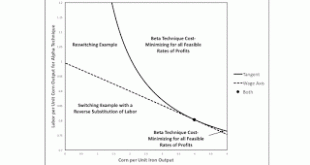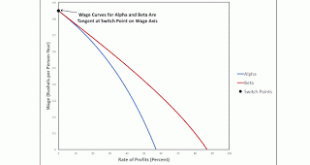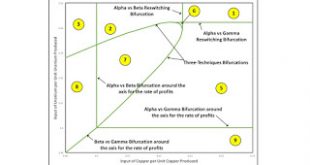A July 24 Jonathan Schlefer article, "Market Parables and the Economics of Populism: When Experts are Wrong, People Revolt", in Foreign Affairs. Schlefer cites the Cambridge Capital Controversy as a demonstration that the neoliberal political project of remaking the world around unembedded markets is doomed to failure. A September 11 interview with Daniel Kahneman in which he basically credits Richard Thaler with inventing behavioral economics. (In his memoirs, Misbehaving, Thaler is also...
Read More »Others With Points Of View Like Sraffa’s
In Production of Commodities by Means of Commodities, Sraffa writes: "others have from time to time independently taken up points of view which are similar to one or other of those adopted in this paper and have developed them further or in different directions from those proposed here." -- P. Sraffa (1960): pp. vi - vii. Who is Sraffa talking about? I suggest the following, and their works, at least: Tjalling C. Koopmans (1957). Three Essays on the State of Economic Science. New York:...
Read More »Economic Impact Of Regional Disasters: A Job For Input-Output Analysis?
This post, unfortunately, is inspired by current events. Economists can provide guidance on disaster recovery - for example, from earthquakes and hurricanes. Economists, for a long time, have been developing input-output models of local economies and interactions between them. I think of Walter Isard as a pioneer here. Such models are of practical importance to my post topic. Regional input-output models can describe disasters with either a supply-side or demand-side approach. In a...
Read More »Dean Baker’s Rigged And Robert Reich’s Saving Capitalism
Dean Baker has a new book out: Rigged: How Globalization and the Rules of the Modern Economy Were Structured to Make the Rich Richer. It recounts how laws that define property, markets, and so on have been rewritten, over the last fifty years, to accomplish an upward redistribution of income. This bias for the rich contrasts with the effects of the rules of the game in the half-century golden age following World War II. This is the same theme as Robert Reich's Saving Capitalism: For the...
Read More »Another Example Of A Real Wicksell Effect Of Zero
Bifurcation Diagram for Fluke Switch Point
Figure 1: A Bifurcation Diagram I have previously illustrated a case in which real Wicksell effects are zero. I wrote this post to present an argument that that example is not a matter of round-off error confusing me. Consider the technology illustrated in Table 1. The managers of firms know of three processes of production. These processes exhibit Constant Returns to Scale. The column for the iron industry specifies the inputs needed to produce a ton of iron. Two processes are known for...
Read More »Fluke Switch Points and a Real Wicksell Effect of Zero
I have put up a draft paper with the post title on my SSRN site. Abstract: This note presents two numerical examples, in a model with two techniques of production, of a switch point with a real Wicksell effect of zero. The variation in the technique adopted, at the switch point, leaves employment and the value of capital per unit net output unchanged. This invariant generalizes to switch points with a real Wicksell effect of zero for steady states with a positive rate of growth.
Read More »A Fluke Switch Point With A Real Wicksell Effect Of Zero
Figure 1: A Fluke Switch Point1.0 Introduction A switch point in which the wage curves for two techniques are tangent to one another at the switch point is a fluke. Likewise, a switch point that occurs at a rate of profits of zero is a fluke. This post presents a two-commodity example with a choice between two techniques, in which the single switch point is simultaneously both types of flukes. The wage curves are tangent at the switch point, and the switch point occurs at a rate of...
Read More »Example With Four Normal Forms For Bifurcations Of Switch Points
Figure 1: A Blowup of a Bifurcation Diagram1.0 Introduction I have been working on an analysis of structural economic dynamics with a choice of technique. Technical progress can result in a variation in the switch points and the succession of techniques with wage curves on the outer wage frontier. I call such a variation a bifurcation, and I have identified normal forms for four generic bifurcations. This post prevents an example in which all four generic bifurcations appear. 2.0...
Read More »The Concept Of Totality
This post is inspired by current events "It is not the primacy of economic motives in historical explanation that constitutes the decisive difference between Marxism and bourgeois thought, but the point of view of totality. The category of totality, the all-pervasive supremacy of the whole over the parts is the essence of the method which Marx took over from Hegel and brilliantly transformed into the foundations of a wholly new science. The capitalist separation of the producer from the...
Read More » Robert Vienneau: Thoughts Economics
Robert Vienneau: Thoughts Economics



